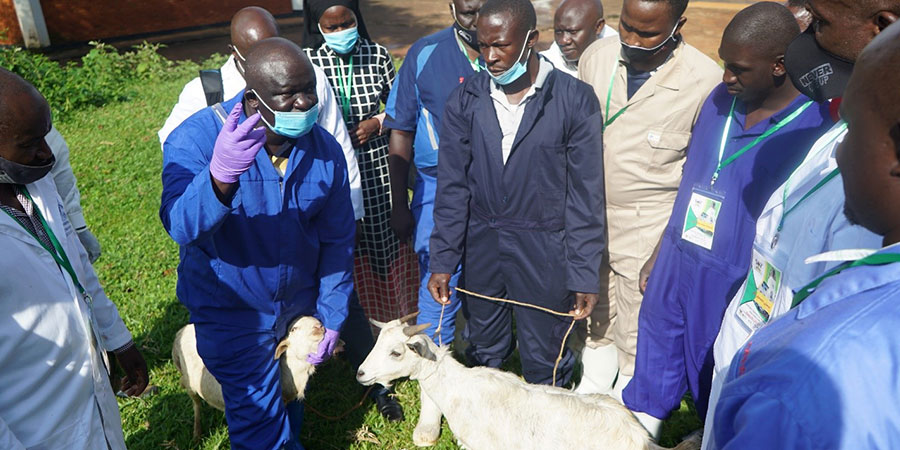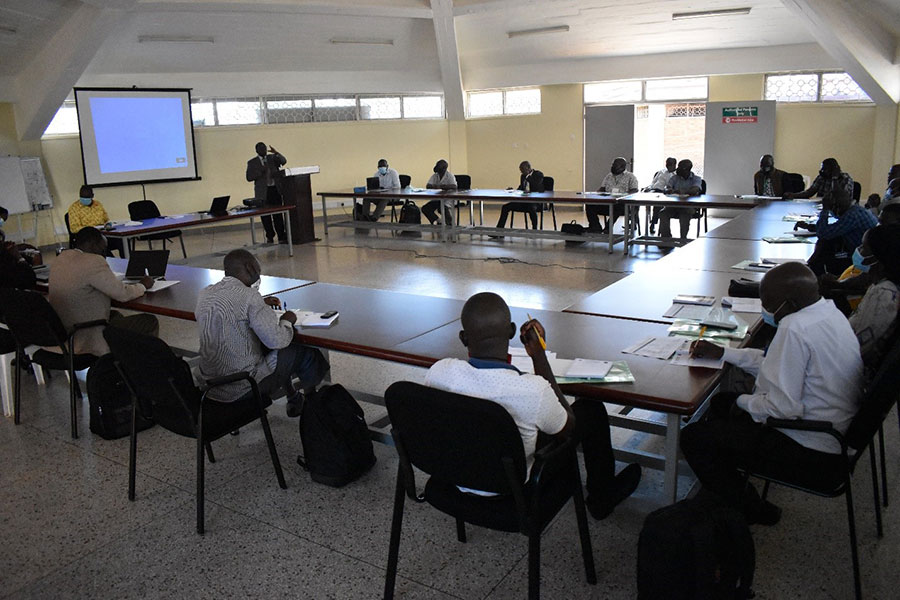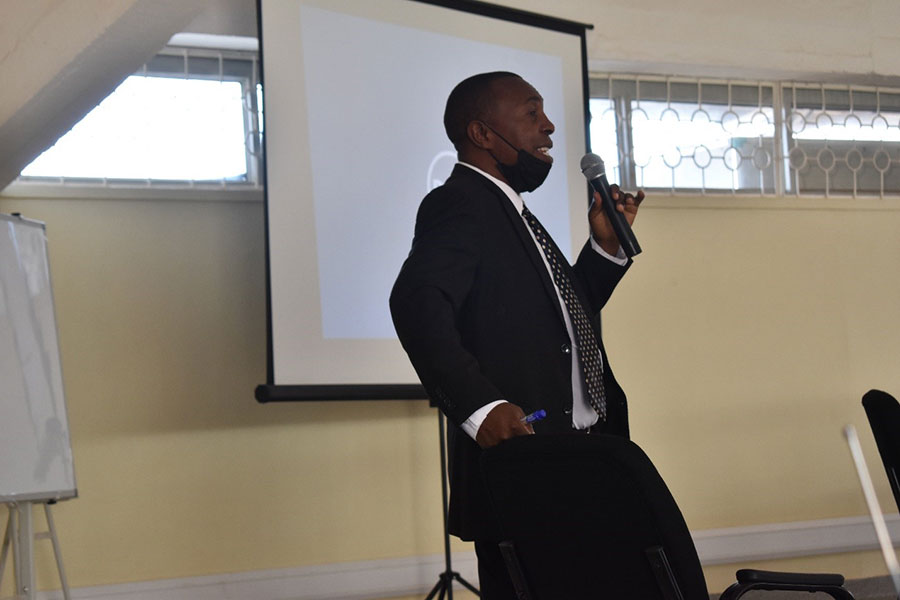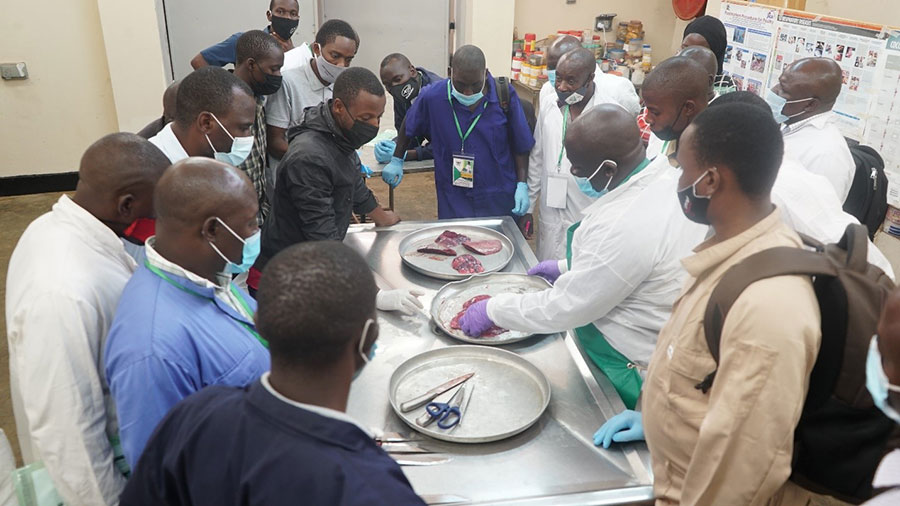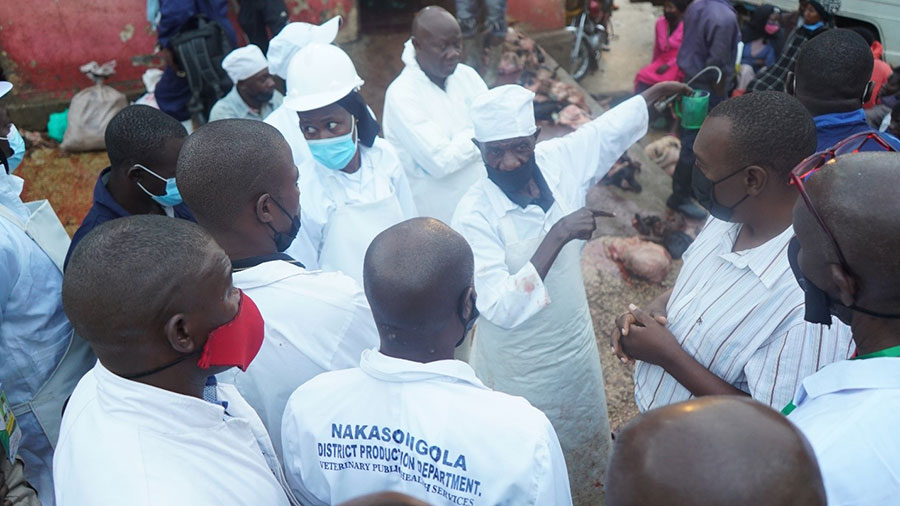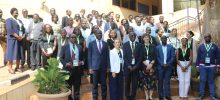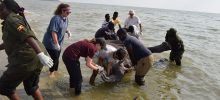Meat Inspectors in Uganda Embark on Achieving Additional Skills to Promote Food Safety in the Meat Value Chain
From 4th October 2021 to 15th October 2021, a refresher training for Meat Inspectors in Uganda was held at the College of Veterinary Medicine, Animal Resources and Bio-security (COVAB) to retool meat inspectors in the country with additional hands-on skills in promoting meat hygiene and food safety.
The two weeks’ workshop was organized by Boosting Uganda’s Investment in Livestock Development (BUILD) project, in collaboration with COVAB, International Livestock Research Institute (ILRI) and Ministry of Agriculture, Animal Industry and Fisheries (MAAIF) – Uganda.
The workshop which brought together meat inspectors from different districts in Uganda was coordinated by CoVAB’s Head of Department of Biosecurity, Ecosystems and Veterinary Public Health, Dr. Clovice Kankya. Participating districts were over 27, to mention but a few which included; Kampala, Nakasongola, Luweero, Kalungu, Masaka, Mukono, Kiryandongo, Wakiso, Arua, Lyantonde, Kumi, Mityana, Bushenyi, Masindi, Kitgum, Fort Portal, Iganga, Gulu, Hoima, Busia, Kasese, Soroti, and Moroto.
During an opening ceremony of this engagement, trainees had an opportunity to meet the College Principal, Prof. John David Kabasa, who doubled as the Guest of Honor for the event. Prof. Kabasa assured them about the College’s gratefulness to host such an important cause, and as well appreciated the efforts of CoVAB’s Partners in supporting matters regarding human and animal welfare.
He later shared the theory of the College’s Change, highlighting the fact that we all live by the market as one of the principles to have a livelihood. He affirmed to participants the opportunities that prevail in the animal world which veterinarians have to protect, since they are custodians of the ecosystem.
“Sustain the welfare of the animals which we consider as resource to humans. We must ensure that animal health isn’t a threat to public health,” said Prof Kabasa.
Dr. Kristina Roesel from ILRI also welcomed and revealed her gratefulness to participants for attending the workshop. She further highlighted on the value of meat inspection to human and animal health.
“Through meat inspection, we can examine and witness many different diseases. We also see the hazards associated with it and find ways of protecting ourselves from these hazards,” affirmed Dr. Kristina.
Participants were retooled with knowledge on the legal framework for meat inspection in Uganda by Dr. Hoona Jolly Justine from MAAIF, transportation of slaughter animals by the Assistant Commissioner, Veterinary Public Health, Dr. Mwesige Theophilus, knowledge on the design and operation of the abattoir by Dr. Kankya, common conditions in shoats, cattle, poultry, pigs (ante and post mortem) by Dr. Terence Odoch, Dr. Wilfred Eneku and Dr. Mathias Afayoa, which were theoretical sessions.
Participants were also trained in digital data collection using the Open Data Kit tool in regards to meat inspection, ante and post mortem inspection in poultry by Mr. Badiru Muyanja from UgaChick, as well as sampling, transport, reporting, and record keeping.
More theoretical sessions included; Hazard Analysis Critical Control by Mr. Justine Okello, Water Sanitation and Hygiene in the Slaughter house by Ms. Ninsiima and Mr. James Muleme.
The training was also coupled with early morning learning sessions in abattoirs such as City Abattoir, Kalerwe abattoir, Wambizi Abattoir, in addition to the practical sessions that were held in the CoVAB slaughter house.
During the closing ceremony of the workshop, on behalf of the College Management, the Deputy Principal, Prof. Samuel Majalija appreciated all participants for being part of this training. He also appreciated all partnering organizations in this cause.
Prof. Majalija highlighted on Uganda’s need for more qualified personnel in promoting food safety, given the high rate of zoonotic diseases spread which is associated with food safety issues.
“Our country has a record of slaughtering from anywhere without keeping track of the practice and number of slaughtered animals. Our inspectors are also few and cannot be everywhere at the same time, and that’s why this training is valuable,” said Prof. Majalija.
He further challenged participants to apply the acquired skill in their work areas.
Dr. Jane Francis Apolot, on behalf of the participants appreciated the efforts of all organizers in this engagement. She highlighted how valuable the training has been to them, since they gained attention towards a number of important aspects such as animal welfare and quality assurance.
The refresher training hosted 40 meat inspectors, 20 from Kampala’s neighboring districts were trained in the first week, while those from far districts were part of this engagement in the second week.
Pictorial
- Prof. John David Kabasa making his remarks during the Meat Inspectors’ refresher workshop on 4th October 2021 at the College Center for Biosecurity and Global health.
- A team of Meat Inspectors who attended the first day of the refresher workshop on 4th October 2021 at the College Center for Biosecurity and Global health.
- Dr. Clovice Kankya presenting the workshop objectives to the participants on 4th October 2021 during the training at the College Center for Biosecurity and Global health.
- Dr. Wilfred Eneku taking participants through post –mortem inspection of the Shoats’ liver at CoVAB Slaughter House on 5th October 2021.
- Dr. Wilfred Eneku taking participants through post –mortem inspection of the Shoats at CoVAB Slaughter House on 5th October 2021.
- Participants have an early morning visit at the City Abattoir to inspect the operation of animal slaughter before meat is taken for sale/ consumption.


